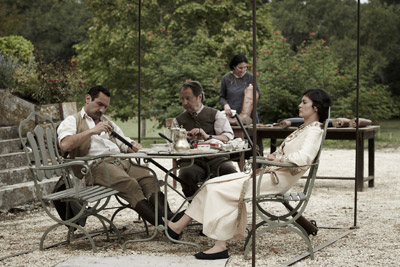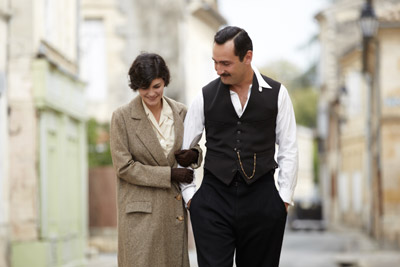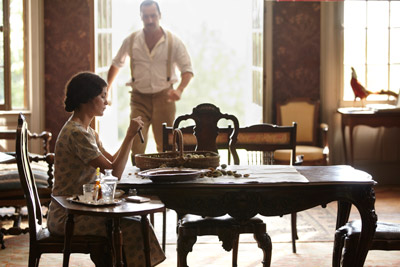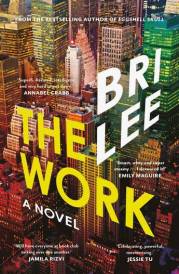Audrey Tautou Thérèse D Interview

Thérèse D
Cast: Audrey Tautou, Gilles Lellouche
Director: Claude Miller
Genre: Drama
Running Time: 110 minutes
Synopsis: When a marriage of convenience proves to be less than that, the free spirited Thérèse finds herself stifled by the surroundings of 1920s provincial France and the intellectual mediocrity of her husband (Gilles Lellouche).
Based on the novel by François Mauriac, the film stars Audrey Tatou as the truly toxic Thérèse Desqueyroux. Her plans to end her life with husband Bernard are based on ending his life completely. After he accidently overdoses on his medicine (Fowler's Solution, which contains arsenic) his wife is inspired to replicate the treatment until suspicions are aroused and she faces trial for his attempted murder.
Release Date: April 11th, 2013
Interview with Audrey Tautou
Question: Claude Miller says he wouldn't have developed the script for 'Thérèse Desqueyroux" if you hadn't accepted the lead role.
Audrey Tautou: He sent me the novel very early on and asked me if I was interested in the part. I was of course very enthusiastic. Thérèse was like a dream script; the work was very different from anything I'd ever been offered. Claude and I had already met ten years earlier for a film. He didn't cast me. We met again a bit later for another project, but that time I wasn't free. And now we have 'Thérèse."
Question: You are mysterious and tough in a way we haven't seen you before.
Audrey Tautou: Thérèse is a cerebral person. She doesn't talk much. No one ever opens up in that family. Playing her, I was constantly asking myself, 'What is she thinking at this exact moment?" Her interior development was just as important to me as the lines I had to deliver. During the whole shoot, I never let myself improvise a single second; I knew exactly at what point she was in her inner turmoil. Thérèse speaks two languages: first, the one you hear; second, and simultaneously, what she can't express. Being forced to keep quiet, she has a constant interior dialogue with herself.
Question: You portray her inner turmoil to perfection.
Audrey Tautou: For each scene I wrote elements of interior dialogue, parallel to the script. I imagined what feelings and frustrations she felt with Bernard and the family – the real words she would have liked to say to them.
 Question: Did you talk to Claude Miller about these 'imaginary" lines?
Question: Did you talk to Claude Miller about these 'imaginary" lines?Audrey Tautou: Strangely enough, no. But when I had doubts about where Thérèse stood, I talked to him about it. For example, when she comes back to see Bernard, just before the trial, and he asks her if she has prepared her defence and she says no, I wondered what her feelings were. Did she feel guilt? Claude just said to me, 'She is arrogant." I can still see his note on the script, 'No pity for idiots!"
Question: That's a very beautiful scene.
Audrey Tautou: Yes. For the first time, we're not talking about superficial things. We're not talking about property or food or the weather. There is finally a connection between them, a truth and intimacy in their relationship, when you would have imagined exactly the opposite. That's Claude Miller's work for you: he gives you life in all its complexity and always escapes clichés. No one is entirely dumb or simple or good or bad. He makes the viewer think and trusts his intelligence.
Question: What was Claude Miller like as a director?
Audrey Tautou: He had an incredibly sharp eye. He was right onto absolutely everything that I could propose to him. It felt like there were two of us in my head! Nothing escaped him. I went to see him to ask if he wanted me to emphasise a feeling a little bit here or there, to make it more explicit, and it was never necessary. Everything had already seemed perfectly clear to him. He had the same vision as I had about Thérèse but it took me a few days to understand that. I had honestly had a completely different idea about how he directed actors. There was something very mysterious about it.
Question: Claude Miller says he doesn't give directions to great actors.
Audrey Tautou: It's true that he didn't give very many, which by the way destabilised me a little at the beginning of the shoot. He joked about it: 'Maybe I'm not demanding enough." He is a unique man and a unique director. He has such acuity and sensitivity that when you meet him, you get the feeling that after five minutes of conversation he knows more about you than you know about yourself in thirty‐five years of life. I felt the same way with Stephen Frears, when I did 'Dirty Pretty Things." They both are people who are interested in others, who love and respect them. Claude really gave us a life lesson on the shoot of 'Thérèse." His kind of patience and kindness is rare. When you see the film he made – brilliant and unrelenting – you think how crazy it is that a film like that could be made with such simplicity.
 Question: Let's get back to the character of Thérèse.
Question: Let's get back to the character of Thérèse.Audrey Tautou: She is a cultivated woman who is well‐read, and reading has opened new windows onto the world for her. She has a great desire to be free, but she bends under the weight of convention. She is full of contradiction; her thoughts are constantly swinging. In choosing to marry, Thérèse sincerely hopes to find salvation and attenuate the weight that burdens her. But marriage changes nothing – quite the opposite. When she realises that her sister‐in‐law was able to leave everything behind for Jean Azevedo, and escape the family confines, Bernard becomes the incarnation of her unhappiness. She ends up poisoning him. I like that she never considers herself a victim. Even when she is locked up and goes from being behind the bars of family obligations to a real jail, she never pities herself. At that moment, she just becomes indifferent to life.
Question: She is a rebel.
Audrey Tautou: Yes and no, actually! But she has the seeds of provocation within her. The scene where the family forces her to come down from her room and out of isolation to greet Anne and her fiancé is a very good example of that. She comes out knowing that the show she will put on is merely a reflection of their monstrosity, and thinks, 'You want me to play the game? Okay, I'll play it – but if you only knew how much I despise you."
Question: You manage to make her turmoil seem almost organic.
Audrey Tautou: I tried to give her a rhythm of her own, different from the others. She is the only one who has to live with managing a mind in perpetual turbulence. And the more time passes, the more she becomes a spectator and distances herself. That is why I imagined there was something slower about her, as if she had to constantly make an effort to keep herself from exploding.
Question: Gilles Lellouche says you worked a lot together on the film.
Question: With this role, we get the feeling that you are turning a new page in your career.
Audrey Tautou: I'm not the same woman I was when I was twenty‐two years old; I don't feel genuine in young ingénue parts any more. In Anne Fontaine's 'Coco Avant Chanel" (Coco before Chanel) I had already taken on a different kind of character, but 'Thérèse Desqueyroux" led me into entirely new terrain that I loved exploring. It was more violent, more complex and more outlandish, too. Claude was master of that. This role came at a moment in my life when I must have had an unconscious need for change.
MORE
- Mission: Impossible Fallout
- Glenn Close The Wife
- Allison Chhorn Stanley's Mouth Interview
- Benicio Del Toro Sicario: Day of the Soldado
- Dame Judi Dench Tea With The Dames
- Sandra Bullock Ocean's 8
- Chris Pratt Jurassic World: Fallen Kingdom
- Claudia Sangiorgi Dalimore and Michelle Grace...
- Rachel McAdams Disobedience Interview
- Sebastián Lelio and Alessandro Nivola...
- Perri Cummings Trench Interview



